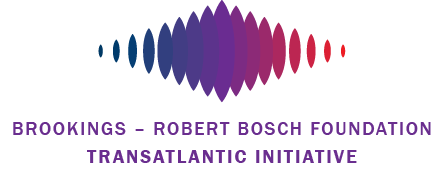

9:00 am EDT - 10:30 am EDT
Past Event
On April 8, the Center on the United States and Europe (CUSE) and the Brookings – Robert Bosch Foundation Transatlantic Initiative hosted a panel discussion on China’s sanctions against European parliamentarians and scholars. Moderated by CUSE Director Thomas Wright, the panel featured Members of European Parliament Reinhard Bütikofer and Miriam Lexmann, National Security Council Senior Director for China Laura Rosenberger, and Member of the Seimas of the Republic of Lithuania Dovilė Šakalienė.
In March, the Chinese Communist Party (CCP) imposed sanctions on European Union (EU) and British parliamentarians, think tanks, academics, and EU committees, a move that Beijing claimed was a response to coordinated sanctions placed by the EU, United Kingdom, United States, and Canada on Chinese government officials connected with human rights abuses in Xinjiang.
The panelists agreed that China’s sanctions prove the CCP fundamentally misunderstands both democratic governance and “the mood” toward China in Europe. While Šakalienė situated China’s actions within a larger intimidation strategy, Bütikofer suggested that the sanctions are a signal of political defeat, rather than strength.
On the impact of China’s sanctions on the EU-China Comprehensive Agreement on Investment (CAI), Bütikofer argued that China misanalyzed what the CAI meant for EU-China relations. China falsely believed that the finalization of the CAI meant “they had finally achieved one of their main goals of driving a wedge between the European Union and the U.S.,” he said, but in fact, after the CCP’s sanctions, the deal “is as dead as a doornail.” Bütikofer further stressed that the CAI was never of economic value to China; it was a political affair and “a great geopolitical gift from the European side to Xi Jinping.” Both he and Lexmann suggested that there are other, better ways to pursue the EU’s economic interests beyond the CAI, including implementing anti-subsidy measures, banning the import of products of forced labor, creating a human rights due diligence mechanism, and enhancing the EU’s investment screening mechanism.
Lexmann and Šakalienė expressed concerns about doing business with China, with Šakalienė noting that “so-called beneficial economic cooperation […] is a mousetrap.” Lexmann agreed, arguing that democracies often make the mistake of believing that economic cooperation will encourage regimes to follow democratic principles, yet “totalitarian regimes have learned how to use economic cooperation to support the regime.” As a result, democracies must think of a “strategic way to pursue our values strongly and more consistently” when cooperating with non-democracies.
When asked to consider how the West can criticize China’s human rights abuses when it has its own human rights problems to address, Šakalienė urged that while human rights remain an issue, the West acknowledges and tries to solve them. With China, however, “the main idea is to deny.” Bütikofer added that he does not believe “you can only criticize a devil if you are an angel.” And conversely, when China criticizes the West, countries must address these criticisms to avoid being “guilty of double standards.”
Regarding trans-Atlantic cooperation toward China, Rosenberger stressed that it is necessary to work with allies to uphold “the principles of the international order.” Partnerships cannot just be “for countering something else”; they must prove that partners stand “for something.” U.S.-EU coordinated sanctions on China, for instance, proved that “we are for upholding human rights globally,” Rosenberger argued. She proceeded to emphasize that the Biden administration sees value in building more flexible arrangements with allies, stating that “the more connectivity that we can build between our European allies and our Indo-Pacific allies,” the better off all parties will be in addressing “the kinds of coercive activities seen from Beijing.”
In Partnership With


Moderator

Panelist



Constanze Stelzenmüller
March 5, 2026

Suzanne Maloney, Itamar Rabinovich, Mara Karlin, Vanda Felbab-Brown, Stephanie T. Williams, Sharan Grewal, Steven Heydemann, Dafna H. Rand, Aslı Aydıntaşbaş, Kemal Kirişci, Hady Amr, Constanze Stelzenmüller, Pavel K. Baev, Steven Pifer, Ryan Hass, Tanvi Madan, Lynn Kuok, Michael E. O’Hanlon, Caitlin Talmadge, Joshua Rovner, Samantha Gross, William A. Galston, Scott R. Anderson +18 more
March 3, 2026
2026
The Brookings Institution, Washington DC
Thursday, 10:00 am - 12:00 pm EDT